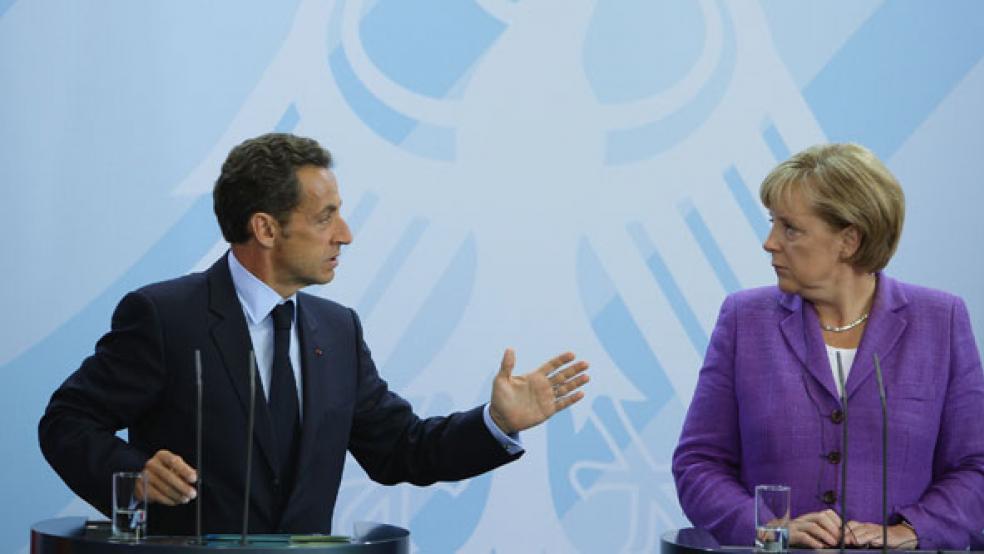It's not simply an austerity backlash in the euro zone; it is a policy backlash, as everyone appears to blame everyone else for a host of overlapping and conflicting policies which clearly aren't working.
A series of political and monetary ructions are showing that it is very difficult to predict with any confidence what path Europe will choose, much less who will lead it there or even how the euro zone will be constituted and organized.
All of this argues for increased risk premia on euro zone assets, a conclusion duly enacted on Monday by financial markets. Little surprise, given developments:
Conservative French President Nicolas Sarkozy came second to Socialist Francois Hollande in a first round election over the weekend, and is expected to lose a May 6 runoff, leaving France likely led by a man who aims to renegotiate the European fiscal pact to make it more growth-friendly. Sarzoky's hopes are now pinned on wooing enough of the nearly 18 percent of voters who opted for far-right, anti-immigration candidate Marine Le Pen. Dutch Prime Minister Mark Rutte and his cabinet tendered their resignation after his coalition was unable to convince the anti-immigration, anti-euro Freedom party to sign on for the budget cuts needed to hit EU targets.
On the same Sunday, May 6, that France returns to the polls Greece is to hold an election, with the largest number of seats expected to fall to the New Democracy party, whose leader Antonis Samaras is pledging lower taxes, of all things, and to call a halt to across-the-board wage and pension cuts, expecting to make up the shortfall through better collections. Magic beans have thus far not been mentioned.
The common denominator here is clearly some measure of revulsion at the prospect and impact of fiscal austerity, and not without some cause. Austerity as it is being practiced, with nation-states expected to slim down without recourse to a weakening currency but instead propped, inefficiently, by the ECB and, insufficiently, by the promise of collective action, is managing at the same time to both stifle growth and make the economy dependent on ECB pain relief.
It is not quite as simple as that. What makes the future path of events in the euro zone even more difficult to forecast is the mass support being won by fringe parties, some of which share antipathy to the euro and immigrants but some of which seem simply eccentric.
EUROZONE BACKLASH
Even in staid Germany, the architect of fiscal austerity, things have taken a turn towards the bizarre, where the amorphous Pirate Party came third in a national opinion poll, behind only Angela Merkel's ruling conservatives and her rival Social Democrats.
The Pirates, whose loose platform concentrates on issues of freedom of speech and freedom of the Internet, recently attracted censure when a leading member compared the party's rise to that of the Nazis, a blunder for which he has since apologized.
Clearly, we are in choppy, if not tremendously deep, waters, making it all the more difficult to predict how things will play out.
Also of interest, and concern, is the growing, if not new, rift between how the ECB believes it should be left to get on with its job and how politicians across the euro zone seem to think things ought to work.
Hollande has called on the ECB to cut rates and to begin to lend directly to governments, a step the bank is by charter forbidden to take. Officials from Spain's Economy Ministry have called publicly on the ECB to increase its purchase of bonds.
"The success of the next phase of the crisis response will hinge on Europe's willingness and ability, together with the European Central Bank, to apply its tools and processes creatively, flexibly and aggressively to support countries as they implement reforms and stay ahead of markets," U.S. Treasury Secretary Tim Geithner told the IMF at its recent meeting. The IMF also pressured the ECB to be more active.
Little of this sits well with the ECB, which probably ultimately will be forced to act in support if events spiral badly, but which surely would do so reluctantly and quite possibly be both a day late and a euro short.
ECB council member and Bundesbank chief Jens Weidmann turned his fire in the opposite direction in a speech in New York on Monday.
"More of the same will not take us anywhere," Weidmann said. "The analgesic we administer comes with side effects. And the longer we apply it, the greater these side effects will be, and they will come back to haunt us in the future."
Weidmann is right: he is being asked to do the impossible, and being asked to do it often by people who are only making his job more difficult and the results of ECB intervention less beneficial.
The only sensible and predictable actors seem to be those who, looking at the scene, are selling euro zone assets.
(James Saft is a Reuters columnist. The opinions expressed are his own.)




